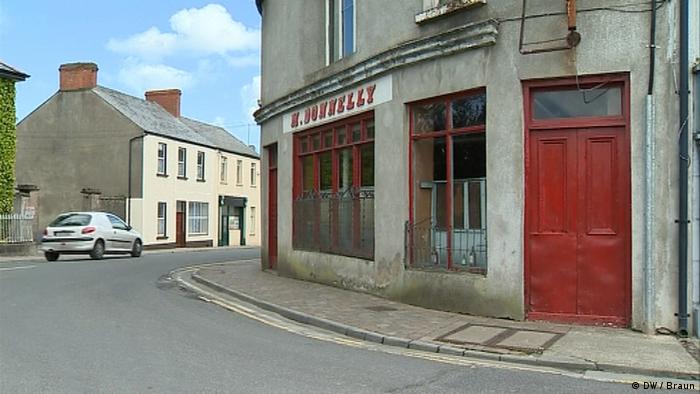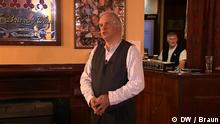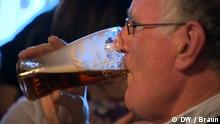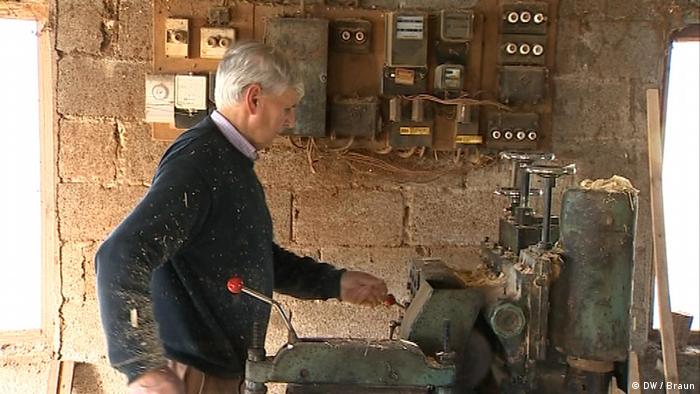
Ireland will hold a referendum on the fiscal compact in late
May. But Dublin could fail. Many Irish have lost hope. The crisis is
even threatening the pubs, the traditional centers of social life in
Ireland.
 Storyteller Vincent Pierse prefers cheerier tales to today's stories
Storyteller Vincent Pierse prefers cheerier tales to today's storiesHe left in such a hurry, Hadn't time to close the gate.
Don't know if he'll come back again, Or we will see him more.
But we are very sorry that the tiger left our shore."
Vincent Pierse is standing in his favorite pub in the town of Roscommon, reciting one of his own poems. The stories he tells aren't always this melancholy - in fact, he generally prefers tales of a cheerier kind.
Storytelling is an ancient Irish tradition, and Vincent has even demonstrated this art on tours in North America. But most of all, Vincent enjoys telling his tales in the pub.
Center of social life
An Irish pub is more than just a bar. It means home, community and cultural heritage, and it's often the center of social life in rural areas. But many pubs are closing as the Irish economy suffers. As Vincent laments, the Celtic Tiger is long gone, and people are worried about the future. "Don't ask what the future is going to bring - I don't know", says pub owner John Murray, and adds that he wouldn't recommend anyone to start running a pub now. "It's not a good life at the moment for making a living."
 Many Irish used to go down to the pub for a pint every day
Many Irish used to go down to the pub for a pint every day John Murray's pub is famous throughout Ireland. His father was a famous Gaelic soccer player. The ball with which his team won the 1944 All-Ireland championship still hangs above the bar - it even survived a fire in 1990. Roscommon once had a good two dozen pubs; now there are only half as many, and more are closing every month.
Shattered dreams
Many in Roscommon dreamed of paradise during the last economic boom in Ireland. Banks granted cheap building loans, and a lot of people who couldn't really afford a home believed the promises the bankers were giving them.
Standing in front of a half-finished house, Vincent recites another poem of his:
“The young couples of this country, They were led a merry dance
By the bankers and developers, They really had no chance,
They had to buy a property, Their family to rear,
Now they're left with overdrafts, And no one seems to care.”
Roscommon is a typical Irish town: It has some 5,000 residents, a few businesses, a local newspaper. Shops have closed down everywhere, and 'for sale' or 'to let' signs are posted in many windows. It's largely small business that have had to close in the past few years - hardest hit is Roscommon's construction industry.
John Gillooly is likely to be the next victim. He ran his cabinetry business for 40 years, eventually specializing in building stairs. "We used to make five or six stairs a week, and we also used to make school furniture." When times were good, Gillooly had several employees and they could barely keep up with the orders.
"That's all stopped now", he says. "If you make one stairs a week now you would be doing well." Today, John Gillooy is left with just a few machines. He has decided to give up. Soon he'll be shutting his doors for the last time. In his window now you see a sign that reads the words of sorrow: "to let."
 Carpenter John Gillooly has already put up the 'to let' sign
Carpenter John Gillooly has already put up the 'to let' signBut every crisis can also provide chances. Two and half years ago, Derek Allen and his brother took over their father's farm. They couldn't get a loan, so they've had to build things up step by step, which has left them debt-free today.
Allen is glad that he and his brother started when they did rather than back in the good times, he says. "We could have lost contracts, people would have stopped buying from us. I'm sure we would have have had huge repayments and we would be have been in big trouble like most businesses." Today, the farm produces top-quality meat, and they grow their own feed for the animals. "It's been great benefit to us to start when we did.”
Stories like Derek Allen's are rare in today's Ireland, however. Back in John Murray's pub in Roscommon, storyteller Vincent Pierse closes with this message to his audience:
"So if you meet the tiger, will you tell him to come back,
Tell him we have no money, And work is very slack,
Tell him that we're all depressed, That we cannot take much more,
So we will be all listening, For to hear the tiger roar.”
Author: Veit-Ulrich Braun / nh
Editor: Gabriel Borrud
沒有留言:
張貼留言